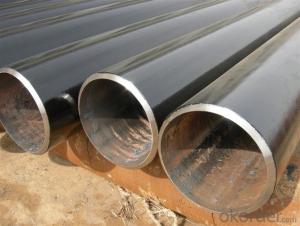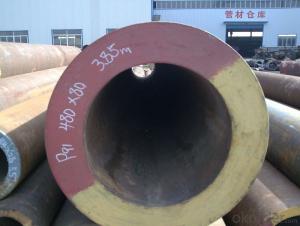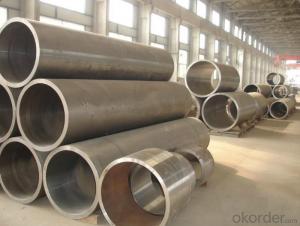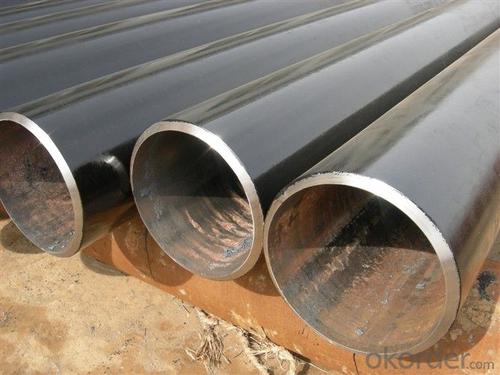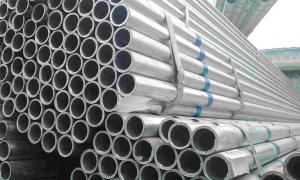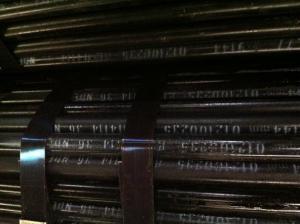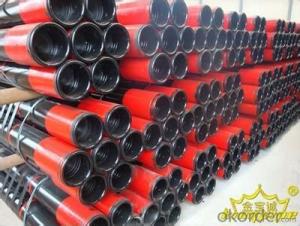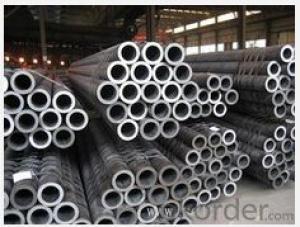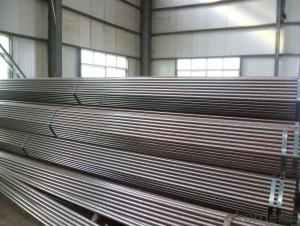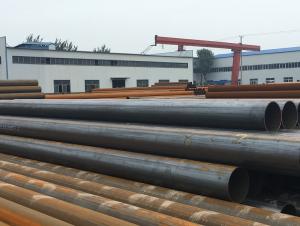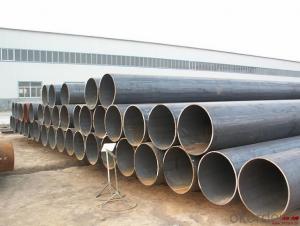Seamless Steel Pipe with High Quality and International Trader
- Loading Port:
- Tianjin
- Payment Terms:
- TT or LC
- Min Order Qty:
- 50 m.t.
- Supply Capability:
- 20000000 m.t./month
OKorder Service Pledge
OKorder Financial Service
You Might Also Like
PRODUCT DETAILS
1.Structure of Seamless Steel Pipe with High Quality and International Trader Description:
A large amount of Seamless Steel Pipes is offered to the clients at cost effective rates. These pipes are extremely durable, resistant to corrosion and have high tensile strength. Our pipes are used in nuclear plants, power plants, refineries and construction industry across the country. Furthermore, we are capable of providing these seamless pipes to the clients in bulk quantity.
2.Main Features of Seamless Steel Pipe with High Quality and International Trader:
• High manufacturing accuracy
• High strength
• Small inertia resistance
• Strong heat dissipation ability
• Good visual effect
•Reasonable price
3.Packaging & Delivery:
| Packaging Details: | Seaworthy packages, bundles wrapped with strong steel strip |
| Delivery Detail: | 15-30 days after received 30% TT |
4.Seamless Steel Pipe with High Quality and International Trader Specification:
| Standard: | GB, DIN, ASTM,ASME, ASTM A106-2006, ASTM A53-2007 |
| Grade: | 10#,20#, 45#, 16Mn |
Thickness: | 8 - 33 mm |
| Section Shape: | Round |
| Outer Diameter: | 133 - 219 mm |
| Place of Origin: | Shandong, China (Mainland) |
| Secondary Or Not: | Non-secondary |
| Application: | Hydraulic Pipe |
| Technique: | Cold Drawn |
| Certification: | API |
| Surface Treatment: | factory state or painted black |
| Special Pipe: | API Pipe |
| Alloy Or Not: | Non-alloy |
| Length: | 5-12M |
| Outer Diameter: | 21.3-610mm |
5.Product pictures
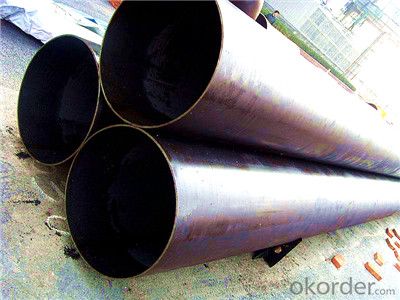
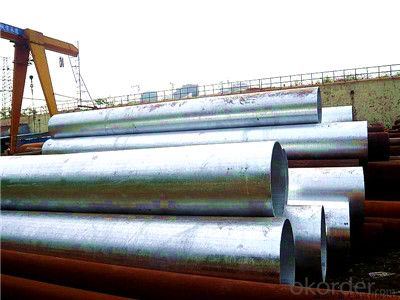
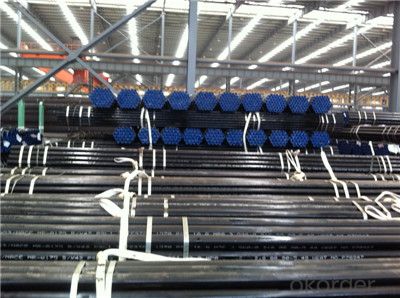
6.FAQ of Seamless Steel Pipe with High Quality and International Trader:
①How is the quality of your products?
Our products are manufactured strictly according to national and internaional standard, and we take a test
on every pipe before delivered out. If you want see our quality certifications and all kinds of testing report, please just ask us for it.
Guaranteed: If products’ quality don’t accord to discription as we give or the promise before you place order, we promise 100% refund.
②How about price?
Yes, we are factory and be able to give you lowest price below market one, and we have a policy that “ for saving time and absolutely honest business attitude, we quote as lowest as possible for any customer, and discount can be given according to quantity”,if you like bargain and factory price is not low enough as you think, just don’t waste your time.Please trust the quotation we would give you, it is professional one.
③Why should you chose us?
Chose happens because of quality, then price, We can give you both.Additionally, we can also offer professional products inquiry, products knowledge train(for agents), smooth goods delivery, exellent customer solution proposals.Our service formula: good quality+good price+good service=customer’s trust.
SGS test is available, customer inspection before shipping is welcome, third party inspection is no problem.
Any question, pls feel free to contact us !
- Q: How do you determine the required support spacing for steel pipes?
- The required support spacing for steel pipes is determined based on several factors including the pipe material, size, weight, and operating conditions. Generally, industry standards and guidelines such as those provided by the American Society of Mechanical Engineers (ASME) are followed to calculate the appropriate spacing. These standards take into account factors such as pipe deflection, thermal expansion, vibration, and load-bearing capacity to ensure the pipes are adequately supported and do not experience excessive stress or deformation.
- Q: How do you calculate the pipe volume flow rate for steel pipes?
- In order to determine the volume flow rate of steel pipes, one must take into account the diameter of the pipe and the velocity of the fluid. The formula utilized in this calculation is Q = A * V, where Q represents the volume flow rate, A denotes the cross-sectional area of the pipe, and V represents the fluid velocity. To initiate the process, the cross-sectional area of the pipe must be determined. In the case of a circular pipe, the formula A = π * r² can be employed, where A signifies the area and r denotes the radius of the pipe. If the diameter of the pipe is provided, dividing it by 2 will yield the radius. Subsequently, the fluid velocity must be established. This can be accomplished by directly measuring the velocity using a flowmeter or by calculating it based on the properties of the fluid and the pressure drop across the pipe using the Bernoulli equation or other suitable equations. Once the cross-sectional area and fluid velocity have been determined, they can be multiplied together to ascertain the volume flow rate. It is important to maintain consistent units throughout the calculation. For instance, if the area is expressed in square meters and the velocity is in meters per second, the resulting volume flow rate will be in cubic meters per second. It is worth noting that this calculation assumes the fluid to be incompressible and flowing steadily through the pipe. If there are alterations in the fluid properties or flow conditions, additional considerations may need to be taken into account in order to accurately calculate the volume flow rate.
- Q: What are the different types of thread connections used in steel pipes?
- The different types of thread connections commonly used in steel pipes include tapered threads such as NPT (National Pipe Taper), BSPT (British Standard Pipe Taper), and API (American Petroleum Institute) threads, as well as straight threads like NPS (National Pipe Straight), BSPP (British Standard Pipe Parallel), and API threads. These connections are used to ensure a secure and leak-proof joint between pipe sections or fittings.
- Q: Can steel pipes be used in extreme weather conditions?
- Yes, steel pipes can be used in extreme weather conditions. Steel is a durable and strong material that can withstand various weather conditions, including extreme temperatures, high humidity, and severe storms. Additionally, steel pipes can be coated or treated to provide additional resistance against corrosion, making them suitable for use in harsh environments.
- Q: What are the factors to consider when selecting pipe materials for high-temperature applications?
- When selecting pipe materials for high-temperature applications, it is important to consider factors such as the maximum operating temperature, corrosion resistance, thermal expansion properties, mechanical strength, and cost. The chosen material should be able to withstand the anticipated temperature without deformation or degradation, resist corrosion from the process fluid or environment, have a low coefficient of thermal expansion to minimize stress on the pipe, possess sufficient mechanical strength to handle the pressure and load, and be cost-effective for the specific application.
- Q: What are the different types of steel pipe couplings?
- In the market, there exists a variety of steel pipe couplings to cater to specific applications and needs. The following are some of the commonly used types: 1. Threaded Coupling: This coupling is equipped with threaded ends for easy installation and removal. It is suitable for low-pressure applications and can be used with both threaded and non-threaded pipes. 2. Compression Coupling: Designed to create a secure and leak-proof connection between two pipes, compression couplings consist of two pieces that are tightened together using compression nuts or sleeves, thus forming a tight seal. 3. Slip-On Coupling: A slip-on coupling is a simple and convenient option that can be easily installed by sliding it onto the pipe ends and then securing it in place through welding or bolting. It is commonly used to join pipes with plain ends and is suitable for both high and low-pressure applications. 4. Grooved Coupling: Grooved couplings possess a groove on both pipe ends, allowing them to be connected by using a rubber gasket and coupling housing. This type of coupling ensures a reliable and flexible connection that can accommodate minor misalignments and vibrations. 5. Flanged Coupling: Consisting of two flanges bolted together with a gasket in between, flanged couplings are widely used in high-pressure applications due to their strength and reliability. 6. Welded Coupling: Welded couplings are permanently joined to the pipe ends through a welding process. This type of coupling guarantees a strong and durable connection that is resistant to leaks and vibrations. These examples represent only a fraction of the steel pipe couplings available. The choice of coupling depends on factors such as the pipe type, application requirements, and the desired level of strength and flexibility. It is crucial to select the appropriate coupling to ensure a secure and dependable connection between pipes.
- Q: How are steel pipes used in the construction of nuclear power plants?
- Steel pipes are used in the construction of nuclear power plants for various purposes, such as transporting and containing fluids and gases, including coolant, steam, and compressed air. They are specifically chosen for their high strength, durability, and resistance to heat and pressure. Steel pipes are used in the construction of primary and secondary cooling systems, reactor vessels, and other critical components, ensuring the safe and efficient operation of nuclear power plants.
- Q: How do steel pipes handle water hammer in high-rise buildings?
- Steel pipes in high-rise buildings are designed to handle water hammer by incorporating various features. Firstly, these pipes are often equipped with pressure relief valves or surge tanks that absorb and dissipate the sudden pressure changes caused by water hammer. Additionally, engineers use techniques such as proper pipe sizing, installation of air chambers, and use of flexible connectors to minimize the effects of water hammer. These measures help to reduce the sudden pressure spikes and prevent damage to the pipes and other plumbing components in high-rise buildings.
- Q: Can steel pipes be used for geothermal systems?
- Yes, steel pipes can be used for geothermal systems. Steel is a commonly used material for geothermal applications due to its durability, strength, and resistance to corrosion. It can effectively withstand the high temperatures and pressures associated with geothermal systems, making it a suitable choice for transporting the geothermal fluid to and from the heat source.
- Q: What are the safety precautions to follow when working with steel pipes?
- When working with steel pipes, it is important to follow several safety precautions to ensure the well-being of yourself and those around you. These precautions include: 1. Personal Protective Equipment (PPE): Always wear the appropriate PPE when working with steel pipes. This includes safety glasses, gloves, steel-toed boots, and a hard hat. PPE helps protect you from potential hazards such as flying debris, falling objects, and sharp edges. 2. Proper Lifting Techniques: Steel pipes can be heavy and awkward to handle. Always use proper lifting techniques to avoid strain or injury. Bend your knees, keep your back straight, and use your legs to lift the pipes. If a pipe is too heavy to lift on your own, ask for assistance or use mechanical lifting equipment. 3. Secure Working Area: Ensure that the work area is clean, organized, and free from tripping hazards. Keep the floor clear of tools, debris, and other obstructions that may cause accidents. Additionally, barricade or cordon off the work area to prevent unauthorized access and ensure the safety of others. 4. Use Proper Tools and Equipment: Use the right tools and equipment for the job. This includes using wrenches, pipe cutters, and clamps designed specifically for steel pipes. Using improper tools can lead to accidents, damage to the pipes, or faulty connections. 5. Proper Storage: Store steel pipes in a secure and organized manner to prevent them from falling or rolling onto someone. Stack the pipes in a stable position, and use racks or supports to ensure they are not at risk of toppling over. 6. Secure Connections: When joining steel pipes, ensure that the connections are properly secured. This includes using appropriate fittings, tight fasteners, and following the recommended torque specifications. Loose or improperly secured connections can result in leaks, bursts, or other failures. 7. Proper Ventilation: If working in an enclosed space, ensure adequate ventilation to prevent the buildup of harmful gases or fumes. Welding or cutting steel pipes can release hazardous gases, so make sure the area is properly ventilated or use respiratory protection if necessary. 8. Fire Safety: Steel pipes can become extremely hot during welding or cutting processes. Have fire extinguishers readily available and know how to use them. Clear any flammable materials from the work area and be cautious of sparks or open flames. 9. Regular Inspections: Regularly inspect steel pipes for signs of damage, such as cracks, rust, or degradation. Replace any damaged or compromised pipes to avoid potential failures or accidents. By following these safety precautions, you can minimize the risks associated with working with steel pipes and ensure a safe working environment. Remember, safety should always be the top priority.
Send your message to us
Seamless Steel Pipe with High Quality and International Trader
- Loading Port:
- Tianjin
- Payment Terms:
- TT or LC
- Min Order Qty:
- 50 m.t.
- Supply Capability:
- 20000000 m.t./month
OKorder Service Pledge
OKorder Financial Service
Similar products
Hot products
Hot Searches
Related keywords
